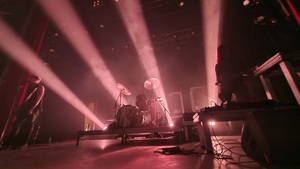Matthew Sweet
Writing His Own Song
Sean Slone
“matt1”
On his 1999 album, In Reverse, Matthew Sweet has a song that seems to sum up what a lot of gifted pop singer-songwriters are going through these days in their battles with increasingly hit-oriented record companies. “Why don’t you write your own song/If mine doesn’t do it for you,” Sweet sings. He talked about the lyric during a late October telephone interview from Los Angeles.
“I think that during that year, before I made In Reverse, I heard a lot of pressure about ‘the song.’ All they care about is the one hit song, nobody cares about artists. It doesn’t matter if you’re good or not, it’s whether they hear a [hit]. And I heard that so much I think one day I just wrote this nasty payback song about it. It’s just a little anthem for my fellow artists and works on kind of another level as well, as a relationship song.”
Now the song can also be read as a kiss-off of his own record company. Because as the 2000 release of a greatest hits compilation, Time Capsule would indicate (“Best-Ofs” are often used as end-of-contractual-obligation filler), Sweet is now label-less. This after a decade that began with the much-praised Girlfriend in 1991, and during which Sweet turned out four other consistently good records, all represented on Time Capsule. The record also includes the obligatory two new songs.
Although Sweet had released two solo albums prior to Girlfriend (1986’s Inside and 1989’s Earth), it was that record that seemed to put everything together. In the reverb-heavy early ’90s, the record’s dry mixes and guitar-heavy hooks combined with Sweet’s meticulously layered vocals were something of a revelation. Sweet’s songs of loneliness and godlessness had a loose, garage rock feeling that recalled late period Beatles but seemed somehow out of time as well.
“That was one thing about having to put the “best-of” together is that it forced me to really listen to that record, which I just felt like I knew so well I would never listen to it again,” Sweet says. “I think it has a really interesting sound to it… It was really a sort of defiant record compared to my first couple of records. It was just totally how I envisioned it and I was in a real control freak mode at that time. But the songs make it what it is. It always kinda comes down to the songs.”
When it came time at the end of 1999 for critics to compile their best of the ’90s lists, Girlfriend was an oft-cited choice. Many of Sweet’s fans probably still consider that the apex of his career. And Sweet says that doesn’t bother him.
“I’m glad to have any record people respect that much. It’s funny because on In Reverse, which was really not one of my most successful records, it was the first time I started getting some reviews where people said it was as good as Girlfriend on its own terms. And I got to feel the feeling of people letting it go a little bit. But then to have to put together this “best-of” right after that, I realize why it’s an important one.”
Sweet’s follow-up, 1993’s Altered Beast, was a darker, more angst-filled record that seemed to reflect a bit of post-stardom turmoil.
“At the time it was really like it had leprosy and nobody wanted to deal with it and get into it. And sort of people all immediately said ‘oh, it’s not like Girlfriend.’ I guess I expressed a lot of pent-up frustrations in that record.”
“matt2”
The somewhat sunnier 100% Fun in 1995 seemed to put things back on track, and allowed Sweet to score one of his biggest hits, “Sick of Myself.”
“I think after Altered Beast, I felt like I needed to re-group and make a record that was simple and direct. And I wanted to make sure that it sounded really good because everybody complained that Altered Beast sounded really bad at the time. I guess that’s why I started looking around [for] who makes records I think sound really good and that’s when I hooked up with [producer] Brendan [O’Brien]… And he was kind of the first person I worked with who really wanted to move as fast as I did and do stuff and get instant gratification.”
1997’s Blue Sky On Mars, also produced by O’Brien, was more of a do-it-yourself affair. After years of relying on hired hands like ace guitarists Robert Quine (Lou Reed, Richard Hell) and Richard Lloyd (ex-Television), Sweet played all the guitar himself.
“It was supposed to be a really simple, new wave kind of record… and not quite so rooted in the past. And I think in a way it suffered because of that… It was almost like it was unpopular with my old fans to use keyboard sounds and stuff. I noticed in the years after it, there was more stuff that was like that.”
But Sweet says the DIY approach on the record suited him well. “In a way I think of myself like I’m a painter or something and I paint paintings that look like me or like I painted them. I’m way more comfortable in a band than I used to be… When we had to start touring for Girlfriend, I would just crank up my amp and close my eyes and go for it. [Now] I’m much more comfortable with a band and doing live shows… But it’s much more of a rewarding creative experience when I’m in the demo stage when I’m playing everything myself, creating it from scratch…”
Still, 1999’s In Reverse found Sweet going in the opposite direction in the studio and found him again mining the past for inspiration. In an attempt to recreate a Phil Spector wall-of-sound for several tracks, the In Reverse sessions often brought together fifteen or more musicians all playing at the same time in the studio. “It really was kind of a deluxe baroque kind of record. And I certainly feel now that I can only go simpler than that. I don’t really want to necessarily go to its extreme unless I did it on a track or two. Because I still hear a Ronettes record on oldies radio or something and it’s still so much more extreme than anything we did in that mode. They’re just really crazy sounding records.”
Although he is often lumped in with other artists like Lenny Kravitz who emulate their musical heroes of the ’60s and ’70s, Sweet says for him it has always been more about borrowing the spirit and the life of old records than the sounds themselves. “I love the Beatles, but I didn’t learn all their songs and how they played and try to do it all exactly like them. I just wanted to be great like them and tried to be inspired by their stuff. And I think that that’s the lesson to be learned from old records is the inspiration of it and the feeling of it.”
So now Sweet finds himself at a crossroads. “I am just kind of getting into a batch of demos. I am in the unique position for the first time in ten years of being totally free. So I’m trying to enjoy that feeling, pretending I never have to get a record deal or figure out anything about that… I’m sort of reticent to jump right into anything because I just want to think about it long and hard, whether it would be better to go at it in a more kamikaze way or not… I sort of feel like before I go to anybody… I want to write some songs and get a feeling like how I want to be and what I want to do. And then I think it’s gonna be easier to know what the right place would be.”
Despite his own problems, Sweet remains cautiously optimistic that things will eventually turn around for pop singer-songwriters, and he believes the time may be ripe for some sort of revolution in the music industry.
“I just feel so much dissatisfaction with anyone I talk to, it makes me think it just has to happen. One way or another, there’s got to be music like we all knew it to be… It’d just be great to see real, personal kind of music that can be a soundtrack to your life coming back where it’s not just a formula. For all I know, kids will cherish their Limp Bizkit or Korn records or Backstreet Boys records or whatever for the rest of their lives. I’m sure they’ll have a fond spot for them, but on a certain level it just doesn’t seem like the kind of thing we looked for in records… My guess is some young band is going to come along that’s real and honest and personal and that will be really rare and different for right now.” ◼












